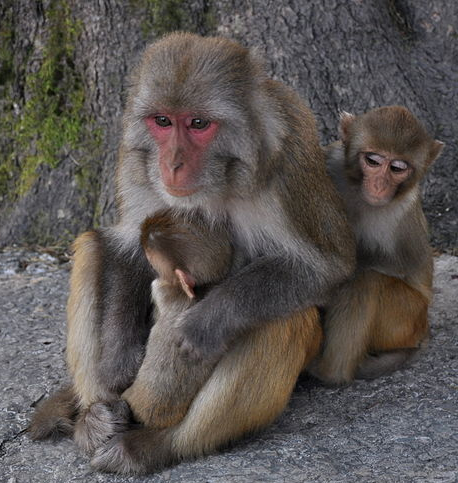We're open daily! View holiday hours
Science News
Monkey Status & Genes
April 10, 2012

Lower social status could make you sick. A study, published yesterday in the Proceedings of the National Academy of Sciences, demonstrates how female rhesus macaque monkeys are affected, down to their gene expression, by their ranking in a social environment.
Researchers, led by Duke University’s Jenny Tung, studied monkeys in captivity and forced social rankings. As they introduced female monkeys to new environments, the first monkey introduced was highest on the social ladder, the last introduced, lowest.
The scientists discovered significant differences in the expression of genes involved in the immune response and other functions between the female rankings. Lower-ranked females were more susceptible to disease than their higher-ranking neighbors. But, when a female’s rank improved, her gene expression also changed within a few weeks, suggesting that social forces can rapidly influence genetic regulation.
The overall genetic “signature” of expression changes allowed researchers to predict an individual monkey’s social rank with 80% accuracy from their gene expression profile alone. That predictive power also enabled an unanticipated second test: could gene expression anticipate unplanned changes in dominance rank?
“It was a fortunate event in the experiment,” co-author Yoav Gilad said. “When a couple of animals were removed from cages for various reasons and new ones were introduced to the groups, it turned out to improve the rank of a few monkeys. We could take advantage of this switch and see if our classifier still works.”
By analyzing blood samples from these monkeys before and after their move, the researchers were able to use gene expression signatures to correctly predict the change in rank for six of seven monkeys. The result demonstrates that socially-induced gene expression changes are not stable, but can change rapidly in response to changes in social environment.
“There’s a spooky side to this kind of research, in that an individual’s social rank is partially determining health status,” Tung said. “But there’s also a hopeful side. For the seven females that changed ranks, their gene status changed with them. They’re not stuck in place, and I think that says something more broadly about the capacity for change.”
“An encouraging message to humans is the fact that the effects are plastic, reversible and change on a really large scale when rank changes,” Gilad said. “Whatever it is that causes stress through social environment, you might be able to fix.”
Image: Aiwok/Wikipedia